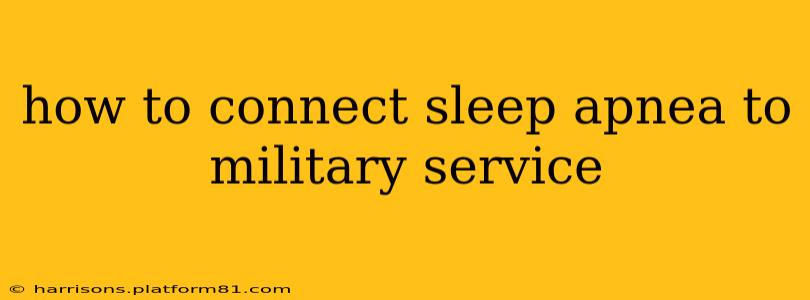Sleep apnea, a condition characterized by pauses in breathing during sleep, can significantly impact an individual's health and well-being. For veterans and active-duty military personnel, establishing a connection between sleep apnea and military service is crucial for accessing vital healthcare benefits and disability compensation. This process can be complex, but understanding the potential links and the necessary steps involved is essential.
What is the Connection Between Sleep Apnea and Military Service?
Several factors contribute to the link between sleep apnea and military service. The high prevalence of sleep apnea within the military population stems from several interconnected causes:
-
Occupational Hazards: Exposure to loud noises, shift work, and irregular sleep schedules are common in military life. These factors disrupt sleep patterns, increasing the risk of developing sleep apnea. Deployment to combat zones further compounds this issue due to increased stress and irregular sleep environments.
-
Physical Demands and Injuries: The physically demanding nature of military training and operations can lead to weight gain, obesity, and neck injuries—all known risk factors for sleep apnea. Traumatic brain injuries (TBIs) sustained during service are also linked to a higher incidence of sleep apnea.
-
Exposure to Hazardous Substances: Exposure to certain chemicals or toxins during service may contribute to the development of sleep apnea, although more research is needed in this area.
How Can I Prove My Sleep Apnea is Service-Connected?
Connecting sleep apnea to military service for disability compensation requires strong evidence. This typically involves:
-
Medical Records: Thorough documentation of your sleep apnea diagnosis, including sleep studies (polysomnography), is crucial. These records should be reviewed for any mention of potential contributing factors related to your military service.
-
Military Medical Records: Your service medical records are essential. These records might contain information about your sleep habits, symptoms experienced during service, any diagnoses made during your time in the military, or treatments received. Even seemingly unrelated entries could be relevant, such as notes about weight changes, neck injuries, or exposure to potentially harmful substances.
-
Lay Statements: Statements from fellow service members, family members, or others who witnessed your symptoms during service can bolster your claim. These statements should describe the observed symptoms and their potential impact on your ability to perform military duties.
-
Expert Testimony: A medical professional familiar with sleep apnea and its connection to military service can provide expert testimony supporting your claim. This can be particularly valuable in establishing a clear link between your service and your condition.
What if My Sleep Apnea Wasn't Diagnosed During My Service?
Even if your sleep apnea wasn't diagnosed while you were in the military, you may still be able to establish a service connection. This requires demonstrating that the condition existed during your service and was at least aggravated by your military experience. This might involve corroborating evidence from the points mentioned above, focusing on the potential service-related factors that could have contributed to or worsened your sleep apnea.
What are the Benefits of Establishing a Service Connection for Sleep Apnea?
Successfully connecting your sleep apnea to your military service can open the door to significant benefits, including:
-
Disability Compensation: This can provide financial assistance to help cover the costs of treatment, medication, and other related expenses.
-
Healthcare Benefits: Access to VA healthcare services, including treatment for your sleep apnea and related conditions.
-
Improved Quality of Life: Knowing your condition is recognized and supported can significantly improve your overall well-being.
Where Can I Find More Help?
The VA website provides detailed information on filing claims for disability compensation. You can also seek assistance from veterans' service organizations, legal professionals specializing in veterans' benefits, or healthcare providers experienced in treating veterans with sleep apnea. Remember that navigating the claims process can be complex, so seeking professional guidance is highly advisable.
This information is for general guidance only and should not be considered legal or medical advice. Always consult with qualified professionals for personalized advice related to your specific circumstances.
